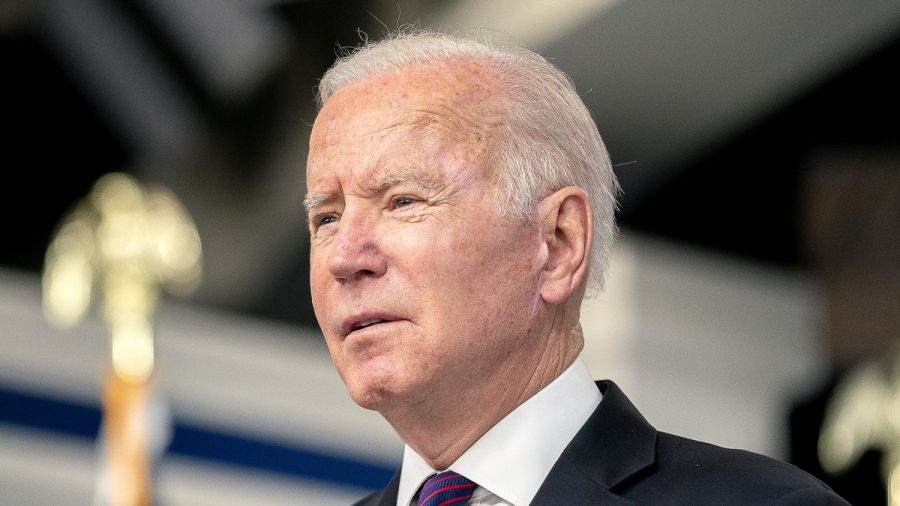President Biden’s Falling Approval Ratings Should Raise Questions
Approaching the second year of his presidency, President Biden’s administration has had its back against the cold, unforgiving wall of American politics. This is bound to be a norm for any administration in power, but following the chaotic American troop withdrawal from Afghanistan, President Biden’s approval ratings have not been as positive.
For many Americans, the Afghan atrocity was a stark reminder of how poor our international relations are. Although President Biden prioritized the ongoing discussions of troop withdrawal from Afghanistan, his solution was unsuccessful. America, along with much of the free world, had to bear witness to large scale bloodshed in the middle east. Thirteen U.S. troops were killed, as well as countless other Afghan allies. When the evacuation reached its catastrophically messy conclusion, not only were U.S. troops trapped in the now Taliban-overrun country, but it tasked them with resettling Afghans who fled their country. Similarly, America still struggles to get a firm grip on the ongoing U.S.-Mexico border crisis, which continues to see a surge in undocumented migrant children arriving at the southern border.
However, it is not just the lackluster response to foreign affairs that has President Biden’s approval ratings on the wane, as inflation continues to be a concern. Despite President Biden’s immense success passing his infrastructure bill, a new Quinnipiac University national poll finds his approval rating at a historic new low of 36%. It was even reported by USA Today that former President Donald Trump would sustain a sizable double-digit lead over Biden in a hypothetical 2024 presidential rematch.
President Biden, along with Vice President Harris’s lackluster approval ratings, should be a rousing cause of concern for Democrats — especially as the 2022 midterm elections approach. President Biden’s administration has seen favor with its ambitious vaccination goal and unprecedented infrastructure bill victory. However, to amass a substantial recovery in time for his 2024 reelection bid, President Biden needs to boldly confront America’s stance in foreign relations, something many Americans feel his administration continues to evade. Specifically, President Biden’s Afghan troop withdrawal drew substantial outrage because it allowed for the Taliban, an American enemy, to make a full-fledged resurgence, overtaking a region we have spent 20 years defending. To many, the president’s move seemed like a concession of our country’s fight against terrorism. Biden does not need to be a warmonger to ensure foreign allies and enemies respect America, but he needs to demonstrate there is a commitment to ensuring America’s safety. With the ongoing crisis at our southern border as well as the reemergence of the Taliban and ISIS caliphate, it is clear not enough has been done on this front.
This is where Democrats should truly start to worry, as it is issues like border control that former President Donald Trump was able to capitalize on during the 2016 election. Specifically, Trump excelled at painting a damning image of America’s foreign relations — especially in Hispanic and Muslim countries. President Biden’s inadequate responses to both of these countries’ migrant populations are what will inevitably leave the door open for Trump to attempt a comeback and energize his steadfastly loyal base, who wholeheartedly believes that immigrants are taking advantage of the U.S. In this regard, Trump has proven his presidential campaign could be successful while weaponizing our country’s foreign policy flaws, propagating xenophobic and nativist messages.
At this junction, the success of a 2024 Trump campaign is surprisingly contingent upon how the Biden administration responds to these issues. If Biden seeks to ensure Democrats hold onto power all while regaining the already-fragmented approval and trust of voters, he will have to prove that he is capable of negotiating in foreign affairs to doubtful Americans. The issue many voters have with the Biden administration is not necessarily his presence as a leader within the country but how foreign allies and adversaries perceive this presence. Voters are failing to connect with how this administration handles America’s foreign matters in light of his highly questionable orders like the violent troop withdrawal from Afghanistan or the dodgy response to the border.
While President Biden has taken active steps to “build back better” for America by leading the country out of the darkest days of the COVID-19 pandemic, there is much work to be done to rebuild domestic trust in our handling of foreign affairs. If Biden and the Democratic party want to secure success in the 2022 midterms and 2024 presidential election, they will have to immediately outline comprehensive plans to rectify the ongoing immigration crisis. Failure to do so will only give way to Trump’s looming presence and further polarize our nation.
Now is the time for Democrats to clearly and emphatically inform Americans of what they will do to relieve America’s foreign tensions. If they do not, voters will most likely turn to the G.O.P for answers — which are likely rooted in Trumpism.
If Biden looks to “build back better” for America, he will have to start by building back voters’ trust in his administration’s handling of foreign relations. Or else, voters may start dusting off the red hats as they take to the polls in 2024.
Noah Osborne, FCRH ’23, is a journalism major from Harlem, N.Y.








































































































































































































